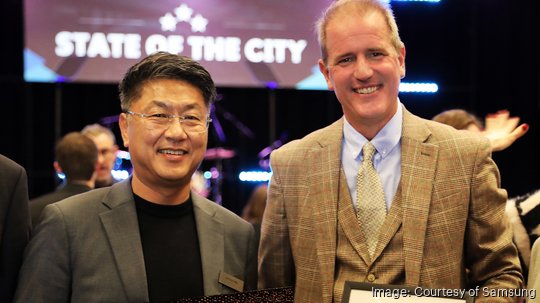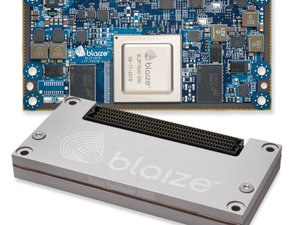
Global electronics giant Samsung Electronics Co. Ltd. is developing technology for artificial intelligence, server, mobile phone and automotive microchips at its new offices in Folsom.
Samsung’s new advanced computing lab will work on advanced controller technology in the Folsom office, said Jinman Han, president of Samsung Semiconductor Inc. in the U.S.
Samsung quietly opened its offices in November, and it has already found good engineering talent, Han said. “Folsom has deep talent in hardware and software.”
Samsung Folsom has about 25 engineers now and it should get to 50 employees over a couple of years, Han said. The local office could grow larger and faster depending on talent.
The Folsom office is also working on smart memory technology chips, which expand the memory of devices.
Samsung sought the local office as it is targeting the microchip design talent around Folsom, and it also liked the location because it works with R&D teams at other chipmakers, including Intel Corp. (Nasdaq: INTC), which has a large campus down the street from Samsung’s new location.
Samsung’s new Folsom office is at 2365 Iron Point Road, just down the road from the memory chip R&D offices of Micron Technology Inc. (Nasdaq: MU) and Intel’s 5,000-employee campus. Tokyo-based Kioxa, a memory chip company spun out of Toshiba Corp. five years ago, also has an R&D office in Folsom, said Joe Gagliardi, CEO of Choose Folsom, the visitors authority, chamber of commerce and economic development group for Folsom.
The addition of Samsung’s Folsom operations adds to a hub of microchip and memory chip research and development offices in the region, said Michelle Willard, chief public affairs officer with the Greater Sacramento Economic Council. More research labs tend to attract more companies to mine the existing talent.
The Sacramento market has access to highly specialized hardware engineers and chip architects who develop microchip and memory chip technologies. Another local chip R&D shop is nearby in Rancho Cordova, where flash memory company Solidigm has its U.S. headquarters, Solidigm was itself spun out of Intel in 2021 when South Korean chip company SK hynix bought the flash memory business of Intel for $9 billion.
In addition to being a popular consumer electronics brand that includes Galaxy smartphones and watches as well as digital screens and appliances, Samsung is a major producer of memory, storage and processing semiconductors for gaming, automotive and other industries.
The Korean company has been adding more U.S. corporate locations. In addition to its chip technology center in Austin, Texas, which has been there for three decades, Samsung Semiconductor opened a new U.S. main campus in San Jose.
In Folsom, Samsung has been seeking staff engineers for System-on-a-Chip, or SoC, computer memory chip design, with a pay range between $138,000 and $215,000 annually. The company is seeking engineers with eight years or more of experience, according to a job posting on TheLadders.com. On LinkedIn, Samsung a month ago had posted openings for interns in SoC design, whose pay range was $27 to $57 an hour.
The timing for Samsung could be good, because both Intel and Solidigm cut employees last year. Intel cut nearly 550 Folsom employees and Solidigm cut about 280 positions in Rancho Cordova. Most of those layoffs were attributed to a struggling global market for memory chips.
Boise, Idaho-based Micron’s Folsom offices employ about 300. The local Micron research and development operation was also spun out of Intel, although indirectly. In 2010, Micron paid $1.2 billion for Numonyx, an international computer chip developer, created as a joint venture of Intel and STMicroelectronics of Geneva, Switzerland. Numonyx developed memory chips used in cellphones, cars and computers.
In the fall of last year, German manufacturer Bosch paid $42.4 million for the Roseville campus of TSI Semiconductors, where the German engineering company plans to invest $1.5 billion to install a microchip fabrication line for components for electric vehicles and chargers.









